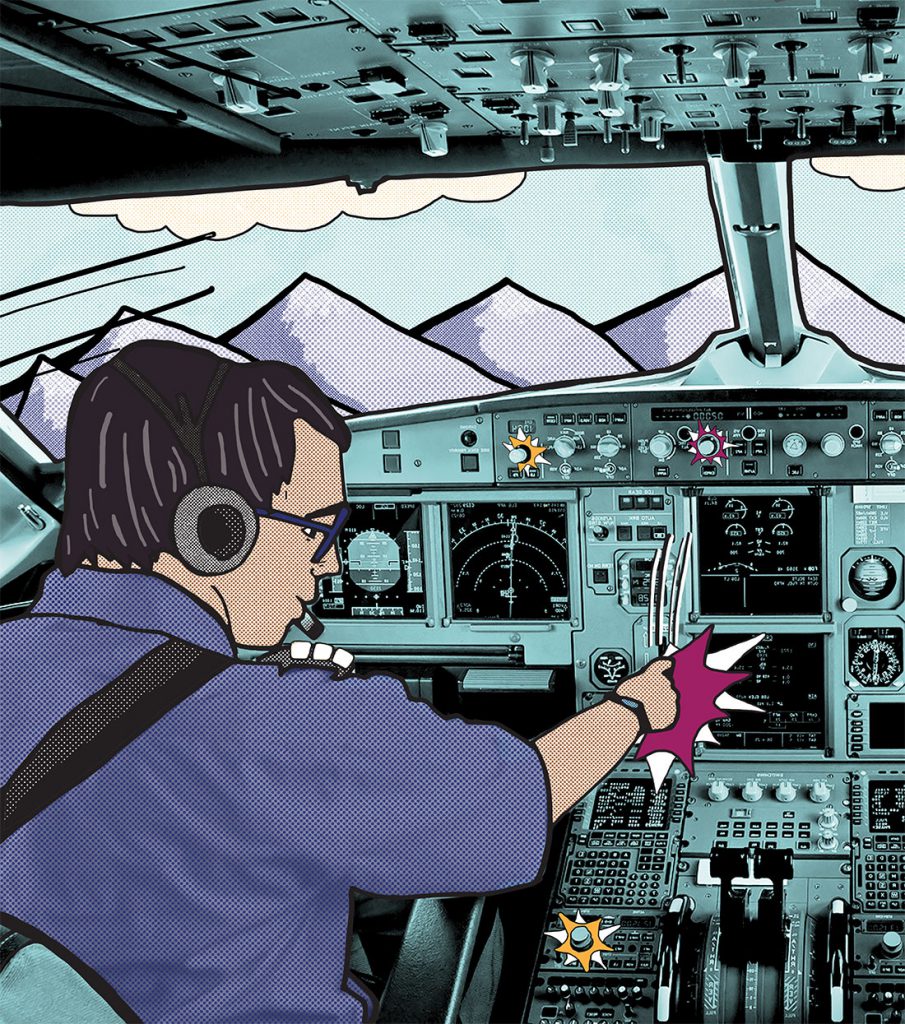
Peak Performance
Shannon Bellamy reflects on his life experiences and how they shaped his approach to ethical decision-making
by Shannon Bellamy, professor emeritus, management and business ethics
illustration by Amber Mott
Ethical decision-making presented itself early in my life. In high school, I flew in airplanes with my dad. He flew jet aircraft professionally, but we spent a lot of time together in propeller-driven aircraft, both single and multiengine. When flying with my dad, I was the pilot in command, meaning I was in the left-hand seat—the captain’s seat—and was the sole manipulator of the controls. I was flying the plane, I was in charge, and I was responsible.
When I was in the captain’s seat, there was always a significant emergency—at least to a 15-year-old. When we were flying a twin-engine aircraft, at least one engine always failed, sometimes both. The radios stopped working, the electric instruments failed, and the landing gear would not go down—a litany of equipment failures. I would eventually learn that these emergencies were in fact not real, because it had been my dad who had turned off the gas to one of the engines or who had tripped all the circuit breakers. He created these emergency situations for me because he knew that they could really happen, and he wanted me to be prepared. It was this concept of being able to make good decisions during times of crisis that led me down the path toward making ethical decisions and using abbreviations to ensure that when real emergencies do happen, the right decisions are made.
The first step in the staged emergencies created by my dad was to reach very quickly for the emergency checklist: reset circuit breakers, boost pumps on, mixture control rich, magnetos on, and restart engine. You cannot always think fast enough to remember everything. You need a checklist, a mnemonic, or an abbreviation (let me call these CMAs) to assist in following the correct procedure.
To ensure the landing was safe, we used a checklist and a mnemonic called GUMPS: Gas, Undercarriage, Mixture, Prop, Speed, and Seatbelt. I said GUMPS at least three times for every landing: during downwind, at turning base, and on final approach. If a landing were to go awry, you could get really hurt, the aircraft could be destroyed, people on the ground could be injured, your passengers might not fare so well, and friends and family would be impacted. GUMPS is a mnemonic that helps ensure a safe outcome.
This may all be fine for flying an airplane safely, but what is the connection to ethics? Try writing down all the CMAs that you use when making ethical choices. My guess is that many of you wrote down very little, or perhaps you wrote down the Golden Rule (do unto others as you would have them do unto you). While there is nothing wrong with the GR, it is too much like, “When your engine fails, restart it.” It does not provide sufficient guidance. You need some sort of ethical GUMPS to guide you in making ethical decisions. Let me offer PEAK, a CMA for ethical decision-making. PEAK stands for Persons, Empathy, Action, and Knowledge.
These individual letters have sub-components (but expanding them all would be too much for this short piece); for example, action means that you not only need to see what the correct action is, but you also need to make that action happen. The launch engineer of the space shuttle Challenger saw what the correct action was, but he failed—and later regretted—that he was not able to convince others. He failed to fully act. In an organizational context, it might take a lot of courage and skill to convince others, but that is what’s required.
The mnemonic PEAK might assist you in getting your ethical “tools” better arranged. You can build your own ethical checklist using PEAK as the framework, as the starting point.
So, the next time you have to make an ethical decision, easy or tough, stop for a moment, do a little practicing, and use a CMA to make sure that your “ethical landings” are safe. No checklist at all does not work for either airplanes or ethics.
About the Westminster Review
The Westminster Review is Westminster University’s bi-annual alumni magazine that is distributed to alumni and community members. Each issue aims to keep alumni updated on campus current events and highlights the accomplishments of current students, professors, and Westminster alum.
GET THE REVIEW IN PRINT STAY IN TOUCH SUBMIT YOUR STORY IDEA READ MORE WESTMINSTER STORIES
